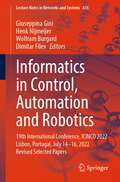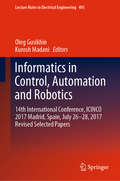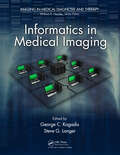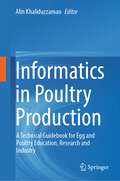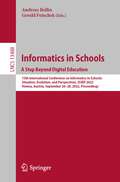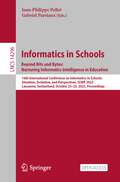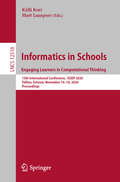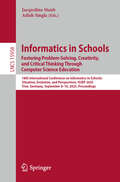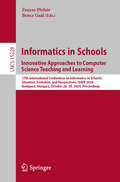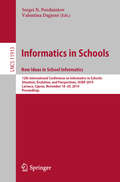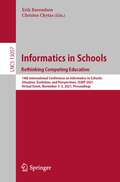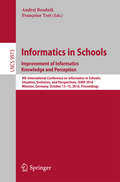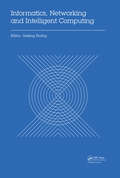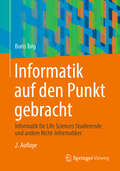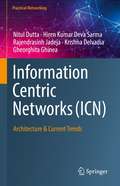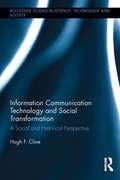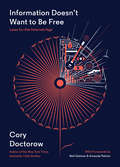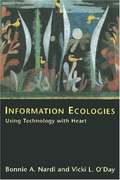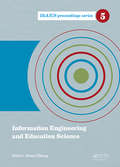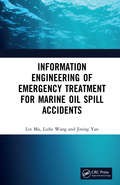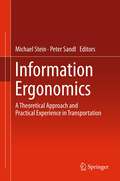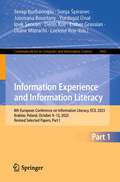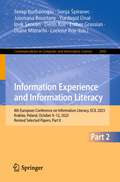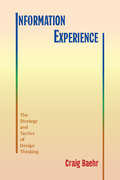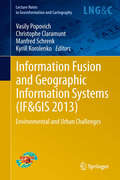- Table View
- List View
Informatics in Control, Automation and Robotics: 19th International Conference, ICINCO 2022 Lisbon, Portugal, July 14-16, 2022 Revised Selected Papers (Lecture Notes in Networks and Systems #836)
by Henk Nijmeijer Dimitar Filev Wolfram Burgard Giuseppina GiniThe book focuses the latest endeavors relating researches and developments conducted in fields of control, robotics, and automation. Through ten revised and extended articles, the present book aims to provide the most up-to-date state-of-the-art of the aforementioned fields allowing researcher, Ph.D. students, and engineers not only updating their knowledge but also benefiting from the source of inspiration that represents the set of selected articles of the book. The deliberate intention of editors to cover as well theoretical facets of those fields as their practical accomplishments and implementations offers the benefit of gathering in a same volume a factual and well-balanced prospect of nowadays research in those topics. A special attention toward “Intelligent Robots and Control” may characterize another benefit of this book.
Informatics in Control, Automation and Robotics: 8th International Conference, Icinco 2011 Noordwijkerhout, The Netherlands, July 28-31, 2011 Revised Selected Papers (Lecture Notes in Electrical Engineering #174)
by Oleg Gusikhin Kurosh MadaniThe book focuses the latest endeavours relating researches and developments conducted in fields of Control, Robotics and Automation. Through more than twenty revised and extended articles, the present book aims to provide the most up-to-date state-of-art of the aforementioned fields allowing researcher, PhD students and engineers not only updating their knowledge but also benefiting from the source of inspiration that represents the set of selected articles of the book. <P><P> The deliberate intention of editors to cover as well theoretical facets of those fields as their practical accomplishments and implementations offers the benefit of gathering in a same volume a factual and well-balanced prospect of nowadays research in those topics. A special attention toward “Intelligent Robots and Control” may characterize another benefit of this book.
Informatics in Medical Imaging (Imaging in Medical Diagnosis and Therapy)
by Adam Zak Bill WaddellInformatics in Medical Imaging provides a comprehensive survey of the field of medical imaging informatics. In addition to radiology, it also addresses other specialties such as pathology, cardiology, dermatology, and surgery, which have adopted the use of digital images. The book discusses basic imaging informatics protocols, picture archiving and
Informatics in Poultry Production: A Technical Guidebook for Egg and Poultry Education, Research and Industry
by Alin KhaliduzzamanThis book discusses table and hatching eggs, quality-based grading of eggs, pre-incubation, incubation, hatching and post-hatch monitoring period, and how the next-generation management of these process can be enriched by informatics through non-destructive technologies, signal processing, machine learning, AI, IoT applications, etc. This book will be a beneficial resource for egg and poultry science researchers, avian biologists and ecologists, developmental biologists, agricultural engineers, advanced graduate and postgraduate students, and poultry production industry stakeholders.
Informatics in Schools. A Step Beyond Digital Education: 15th International Conference on Informatics in Schools: Situation, Evolution, and Perspectives, ISSEP 2022, Vienna, Austria, September 26–28, 2022, Proceedings (Lecture Notes in Computer Science #13488)
by Andreas Bollin Gerald FutschekThis book constitutes the proceedings of the 14th International Conference on Informatics in Schools: Situation, Evolution and Perspectives, ISSEP 2021, held in Nijmegen, The Netherlands, in November 2020. Due to COVID-19 related travelling restrictions the conference had to be switched to online format. The 12 full papers presented together with 4 short papers were carefully reviewed and selected from 57 submissions. They are organized in 2 topical sections named: state of research and best practice, country, and experience reports.As in our school education subjects like “digital literacy" or "media literacy" are making their way in, complementing or partially replacing computer science education. The current ISSEP conference reacted to this trend and therefore invited computer scientists, media didactics, and representatives of politics, media and industry to a discussion round on the topic "Media Education or Computer Science? Quo Vadis, School Teaching?".
Informatics in Schools. Beyond Bits and Bytes: 16th International Conference on Informatics in Schools: Situation, Evolution, and Perspectives, ISSEP 2023, Lausanne, Switzerland, October 23–25, 2023, Proceedings (Lecture Notes in Computer Science #14296)
by Jean-Philippe Pellet Gabriel ParriauxThis book constitutes the proceedings of the 16th International Conference on Informatics in Schools: Situation, Evolution and Perspectives, ISSEP 2023, held in Lausanne, Switzerland, during October 23–25, 2023. The 14 full papers presented in this book were carefully reviewed and selected from 47 submissions. They are organized in four topical sections named: artificial intelligence and its applications; competitions, problem solving, and computational; robotics and unplugged modalities; and curricula and computer science concepts. This is an open access book.
Informatics in Schools. Engaging Learners in Computational Thinking: 13th International Conference, ISSEP 2020, Tallinn, Estonia, November 16–18, 2020, Proceedings (Lecture Notes in Computer Science #12518)
by Mart Laanpere Külli KoriThis book constitutes the proceedings of the 13th International Conference on Informatics in Schools: Situation, Evolution and Perspectives, ISSEP 2020, held in Tallinn, Estonia, in November 2020. Due to COVID-19 related travelling restrictions the conference had to be switched to online format. The 18 revised full papers presented were carefully reviewed and selected from 53 submissions. They are organized in topical sections named: Tasks for Informatics Competitions; Engagement and Gender Issues in School Informatics; Informatics Teacher Education; Curriculum and Pedagogical Issues.
Informatics in Schools. Fostering Problem-Solving, Creativity, and Critical Thinking Through Computer Science Education: 18th International Conference on Informatics in Schools: Situation, Evolution, and Perspectives, ISSEP 2025, Trier, Germany, September 8–10, 2025, Proceedings (Lecture Notes in Computer Science #15958)
by Jacqueline Staub Adish SinglaThis book constitutes the proceedings of the 18th International Conference on Informatics in Schools: Situation, Evolution, and Perspectives, ISSEP 2025, held in Trier, Germany, during September 8–10, 2025. The 13 full papers presented were carefully reviewed and selected from 41 submissions. The papers cover the following topics: Curricula and Computer Science Concepts; Teachers&’ Perspective; AI and Digital Literacy; Programming, Problem Solving, and Computational Thinking.
Informatics in Schools. Innovative Approaches to Computer Science Teaching and Learning: 17th International Conference on Informatics in Schools: Situation, Evolution, and Perspectives, ISSEP 2024, Budapest, Hungary, October 28–30, 2024, Proceedings (Lecture Notes in Computer Science #15228)
by Zsuzsa Pluhár Bence GaálThis book constitutes the proceedings of the 17th International Conference on Informatics in Schools: Situation, Evolution and Perspectives, ISSEP 2024, held in Budapest, Hungary, during October 28–30, 2024. The 14 full papers presented were carefully reviewed and selected from 42 submissions. The papers cover the following topics: curricula and computer science concepts; problem solving, algorithms and programming; teacher’s perspective.
Informatics in Schools. New Ideas in School Informatics: 12th International Conference on Informatics in Schools: Situation, Evolution, and Perspectives, ISSEP 2019, Larnaca, Cyprus, November 18–20, 2019, Proceedings (Lecture Notes in Computer Science #11913)
by Valentina Dagienė Sergei N. PozdniakovThis book constitutes the proceedings of the 12th International Conference on Informatics in Schools: Situation, Evolution and Perspectives, ISSEP 2019, held in Larnaca, Cyprus, in November 2019. The 23 revised full papers presented were carefully reviewed and selected from 55 submissions. They are organized in topical sections named : teacher education in informatics, primary education in informatics, contemporary computer science ideas in school informatics, teaching informatics: from highschool to university levels, contests, competitions and games in informatics.
Informatics in Schools. Rethinking Computing Education: 14th International Conference on Informatics in Schools: Situation, Evolution, and Perspectives, ISSEP 2021, Virtual Event, November 3–5, 2021, Proceedings (Lecture Notes in Computer Science #13057)
by Erik Barendsen Christos ChytasThis book constitutes the proceedings of the 14th International Conference on Informatics in Schools: Situation, Evolution and Perspectives, ISSEP 2021, held in Nijmegen, The Netherlands, in November 2020. Due to COVID-19 related travelling restrictions the conference had to be switched to online format. The 12 full papers presented were carefully reviewed and selected from 29 submissions. They are organized in topical sections named: Fostering Computational Thinking, Programming Education, Advancing Computing Education, and Teachers’ Professional Development.
Informatics in Schools: Improvement of Informatics Knowledge and Perception
by Andrej Brodnik Françoise TortThis book constitutes the refereed proceedings of the 9th International Conference on Informatics in Schools: Situation, Evolution, and Perspectives, ISSEP 2016, held in M#65533;nster, Germany, in October 2015. The 17 full papers presented together with 1 invited talk were carefully reviewed and selected from 50 submissions. The focus of the conference was on following topics: sustainable education in informatics for pupils of all ages; connecting informatics lessons to the students' everyday lives; teacher education in informatics or computer science; and research on informatics or computer science in schools (empirical/qualitative/quantitative/theory building/research methods/comparative studies/transferability of methods and results from other disciplines).
Informatics, Networking and Intelligent Computing: Proceedings of the 2014 International Conference on Informatics, Networking and Intelligent Computing (INIC 2014), 16-17 November 2014, Shenzhen, China
by Jiaxing ZhangThis proceedings volume contains selected papers presented at the 2014 International Conference on Informatics, Networking and Intelligent Computing, held in Shenzhen, China. Contributions cover the latest developments and advances in the field of Informatics, Networking and Intelligent Computing.
Informatik auf den Punkt gebracht: Informatik für Life Sciences Studierende und andere Nicht-Informatiker
by Boris TolgDieses Lehrbuch richtet sich an Studierende von fachfremden Studiengängen mit Informatikanteilen. Ein besonderer Schwerpunkt liegt dabei auf den sogenannten Lebenswissenschaften, wie Medizintechnik, Rettungsingenieurwesen, Biotechnologie, Umwelttechnik oder Verfahrenstechnik. Das Lehrbuch eignet sich für Leser in Studium und Praxis, die sich einen Einstieg in die Informatik verschaffen wollen. Die Besonderheit dieses Buches liegt in der problembasierten Herangehensweise, sowie der nach verschiedenen Taxonomiestufen konzipierten Übungsaufgaben.
Information Centric Networks: Architecture & Current Trends (Practical Networking)
by Hiren Kumar Sarma Nitul Dutta Rajendrasinh Jadeja Krishna Delvadia Gheorghita GhineaThis book aimed at bringing an insight to the ICN network, particularly various architectures, issues and challenges in the new networking paradigm. The book starts with an introduction to the new promising concept of ICN and its origin along with the reason behind this interesting innovation. Different architectures proposed so far in support of implementing the ICN is also discussed in details. Few of the challenges of ICN implementation are enlisted as caching, naming, routing, and security. Each of these challenges with recent development is covered in individual chapters. Moreover, integration of current trends in communication and computing like software defined networking and machine learning approach are another area that this book is focusing. All these chapters highlight the recent developments reported in the area and also discusses the future trends. The book provides an overview of the recent developments in future internet technologies, bringing together the advancements that have been made in ICN. The book includes three unique chapters in the field of ICN research. The first, is the SDN framework for implementing ICN by decoupling data and control plan. The machine learning models for predicting future trends in network traffic and other management activities is another important chapter. This chapter includes the possibilities of using machine learning models for trend prediction to help network administrators and service providers to take care of unexpected sudden change traffic pattern and user behaviour. The third most vital chapter is the security issues in ICN. This chapter includes various facts that influences the security of ICN. Issues involved in naming, caching and routing are discussed separately along with few recent works in these areas. Various types of attacks in ICN are also part of the discussion. The stated book would be useful for researchers in this area and will work as a reference for future work. Moreover, the content of the book would also be suitable as a supporting material for undergraduate and graduate level courses in computer science and electrical engineering.
Information Communication Technology and Social Transformation: A Social and Historical Perspective (Routledge Studies in Science, Technology and Society #25)
by Hugh F. ClineThis book argues that information communication technologies are not creating new forms of social structure, but rather altering long-standing institutions and amplifying existing trends of social change that have their origins in ancient times. Using a comparative historical perspective, it analyzes the applications of information communication technologies in relation to changes in norms and values, education institutions, the socialization of children, new forms of deviant and criminal behaviors, enhanced participation in religious activities, patterns of knowledge creation and use, the expansion of consumerism, and changing experiences of distance and time.
Information Doesn't Want to Be Free
by Neil Gaiman Cory Doctorow Amanda PalmerIn sharply argued, fast-moving chapters, Cory Doctorow's Information Doesn't Want to Be Free takes on the state of copyright and creative success in the digital age. Can small artists still thrive in the Internet era? Can giant record labels avoid alienating their audiences? This is a book about the pitfalls and the opportunities that creative industries (and individuals) are confronting today - about how the old models have failed or found new footing, and about what might soon replace them. An essential read for anyone with a stake in the future of the arts, Information Doesn't Want to Be Free offers a vivid guide to the ways creativity and the Internet interact today, and to what might be coming next.
Information Ecologies: Using Technology With Heart
by Bonnie A. Nardi Vicki O'DayThe common rhetoric about technology falls into two extreme categories: uncritical acceptance or blanket rejection. Claiming a middle ground, Bonnie Nardi and Vicki O'Day call for responsible, informed engagement with technology in local settings, which they call information ecologies. An information ecology is a system of people, practices, technologies, and values in a local environment. Nardi and O'Day encourage the reader to become more aware of the ways people and technology are interrelated. They draw on their empirical research in offices, libraries, schools, and hospitals to show how people can engage their own values and commitments while using technology.
Information Engineering and Education Science: Proceedings of the International Conference on Information Engineering and Education Science (ICIEES 2014), Tianjin, China, 12-13 June, 2014 (IRAICS Proceedings)
by Dawei ZhengThis proceedings volume contains selected papers presented at the 2014 International Conference on Information Engineering and Education Science (ICIEES 2014), held June 12-13 in Hong Kong, China. The objective of ICIEES 2014 was to provide a platform for researchers, engineers, academics as well as industry professionals from all over the world to
Information Engineering of Emergency Treatment for Marine Oil Spill Accidents
by Lizhe Wang Jining Yan Lin MuOil spills are a serious marine disaster. Oil spill accidents usually occur in shipping, ports and offshore oil development. Although most are emergent events, once an oil spill occurs, it will cause great harm to the marine ecological environment, and bring direct harm to the economic development along the affected coast as well as to human health and public safety. Information Engineering of Emergency Treatment for Marine Oil Spill Accidents analyzes the causes of these accidents, introduces China's emergency response system, discusses technologies such as remote sensing and monitoring of oil spill on the sea surface and oil fingerprint identification, studies model prediction of marine oil spill behavior and fate and emergency treatment technologies for oil spills on the sea surface, and emphatically introduces the emergency prediction and warning system for oil spills in the Bohai Sea as well as oil spill-sensitive resources and emergency resource management systems. Features: The status quo and causes of marine oil spill pollution, as well as hazards of oil spill on the sea. The emergency response system for marine oil spills. Model-based prediction methods of marine oil spills. A series of used and developing emergency treatments of oil spill on the sea. This book serves as a reference for scientific investigators who want to understand the key technologies for emergency response to marine oil spill accidents, including the current level and future development trend of China in this field.
Information Ergonomics: A theoretical approach and practical experience in transportation
by Michael Stein Peter SandlThe variety and increasing availability of hypermedia information systems, which are used in stationary applications like operators' consoles as well as mobile systems, e.g. driver information and navigation systems in automobiles form a foundation for the mediatization of the society. From the human engineering point of view this development and the ensuing increased importance of information systems for economic and private needs require careful deliberation of the derivation and application of ergonomics methods particularly in the field of information systems. This book consists of two closely intertwined parts. The first, theoretical part defines the concept of an information system, followed by an explanation of action regulation as well as cognitive theories to describe man information system interaction. A comprehensive description of information ergonomics concludes the theoretical approach. In the second, practically oriented part of this book authors from industry as well as from academic institutes illustrate the variety of current information systems taken from different fields of transportation, i.e. aviation, automotive, and railroad. The reader thus gains an overview of various applications and their context of use as well as similarities and differences in design. This does not only include a description of the different information systems but also places them in the context of the theories and models, which were presented in the first part of this book.
Information Experience and Information Literacy: 8th European Conference on Information Literacy, ECIL 2023, Kraków, Poland, October 9–12, 2023, Revised Selected Papers, Part I (Communications in Computer and Information Science #2042)
by Serap Kurbanoğlu Joumana Boustany Sonja Špiranec Esther Grassian Diane Mizrachi Loriene Roy Yurdagül Ünal Denis Kos İpek ŞencanThe two-volume set CCIS 2042 and 2043 constitutes the refereed proceedings of the 8th European Conference on Information Literacy, ECIL 2023, held in Kraków, Poland, in October 2023.The 47 full papers presented in these proceedings were carefully reviewed and selected from 182 submissions. The papers have been organized in the following topical sections: algorithms, artificial intelligence and information literacy; data literacy and digital literacy; information experience and information behaviour; policy, strategies, frameworks, research and different approaches; credibility, ethics, challenges and new paths; and information literacy instruction and education.
Information Experience and Information Literacy: 8th European Conference on Information Literacy, ECIL 2023, Kraków, Poland, October 9–12, 2023, Revised Selected Papers, Part II (Communications in Computer and Information Science #2043)
by Serap Kurbanoğlu Joumana Boustany Sonja Špiranec Esther Grassian Diane Mizrachi Loriene Roy Yurdagül Ünal Denis Kos İpek ŞencanThe two-volume set CCIS 2042 and 2043 constitutes the refereed proceedings of the 8th European Conference on Information Literacy, ECIL 2023, held in Kraków, Poland, in October 2023.The 47 full papers presented in these proceedings were carefully reviewed and selected from 182 submissions. The papers have been organized in the following topical sections: algorithms, artificial intelligence and information literacy; data literacy and digital literacy; information experience and information behaviour; policy, strategies, frameworks, research and different approaches; credibility, ethics, challenges and new paths; and information literacy instruction and education.
Information Experience: The Strategy and Tactics of Design Thinking (SUNY series, Studies in Technical Communication)
by Craig BaehrInformation isn't simply read or used, rather it creates a holistic experience for users.Information Experience provides a usable framework for developing information products and design thinking practices for a wide range of projects, including application development, content creation, instructional materials, and user experience design. Whether content is created by human, machine, or artificial intelligence, memorable information experiences begin with the user, encompassing how user research, content development strategies, and design tactics fit together in creating engaging information experiences and products. The book provides an in-depth discussion of the components of information experience, including user perception, cognition, environment design, strategic branding, and tactical design. Collectively, these elements provide a foundation for understanding how information products function on a level beyond utility, as holistic and immersive experiences for users.
Information Fusion and Geographic Information Systems (IF AND GIS #2013)
by Vasily Popovich Christophe Claramunt Manfred Schrenk Kyrill KorolenkoThe Workshop Proceedings reflect problems of advanced geo-information science with a special emphasis on environmental and urban challenges. The Proceedings incorporate papers presented by leading scientists doing research on environmental issues from modeling to analysis, information processing and visualization. As well as practitioners engaged in GIS and GIS applications development. The Proceedings pay close attention to the problems of scientific and technological innovations as well application opportunities such as getting environmental and global warming problems under control, as well as the monitoring, planning and simulation of urban systems with respect to economic trends as related to: Artificial intelligence; GIS ontologies; GIS data integration and modeling; Environmental management ; Urban GIS; Transportation GIS; GIS data fusion; GIS and corporate information systems; GIS and real-time monitoring systems; GIS algorithms and computational issues; Landscape studies; Global warming; GIS and the Arctic sea; Novel and emerging GIS research areas; Maritime and environmental GIS; and Coastal GIS.
